
So Easy Baby Food
Homemade Baby Food in Less Than 30 Minutes Per Week

1st edition, Copyright 2009, Fresh Baby LLC All rights reserved.
This book, or parts thereof, may not be reproduced in any form without permission.
Published by Fresh Baby LLC
202 Grove Street, Petoskey, MI 49770
www.freshbaby.com
ISBN: 9780-97-272275-9
Author: Cheryl Tallman
Cover and Book Design: Dylan Tallman, Creative i
Photography: Roger Tallman, Creative i
Editor: Jillian Lieder

Best Sources of Nutrients

| Nutrient | Best Sources |
|---|
| Protein | Chicken, Dairy products, Dry beans, Eggs, Fish, Meat, Nuts |
| Carbohydrates | Bread, Dry beans, Pasta, Potatoes, Rice |
| Fat | Avocados, Butter, Cheese, Cream cheese, Egg yolks, Nuts |
| Vitamin A | Apricots, Broccoli, Carrots, Cheese, Fish, Mangos, Spinach, Sweet potatoes |
| Vitamin B6 | Avacodo, Bananas, Chicken, Dry beans, Eggs, Liver, Meat, Nuts, Potatoes |
| Vitamin B12 | Cheese, Chicken, Eggs, Liver, Meat, Milk |
Other B Complex
Vitamins | Avocados, Broccoli, Dry beans, Liver, Nuts, Sunflower seeds |
| Vitamin C | Broccoli, Cauliflower, Citrus fruits, Kiwi, Papaya, Strawberries, Tomatoes |
| Vitamin D | 15 minutes of sunshine per day, Eggs, Fish, Milk |
| Vitamin E | Dry beans, Nuts, Vegetable oil, Whole grain bread |
| Vitamin K | Broccoli, Cauliflower, Egg yolks, Liver, Peas, Tomatoes |
| Iron | Avocados, Broccoli, Chicken, Dry beans, Meat, Spinach |
| Calcium | Broccoli, Cheese, Eggs, Fish, Sesame seeds, Yogurt |
| Potassium | Avocados, Bananas, Potatoes, Raisins, Squash |
| Zinc | Asparagus, Cheese, Fish, Mangos, Meat, Nuts, Peas, Spinach |

Contents
Fresh Baby Recipes
Healthy Eating Habits
Introducing solid food begins when your baby is about 6 months old. Solid food is, at first, an add-on to the main source of nutrition, breast milk or infant formula. Until your baby is 12 months old, solid food remains a secondary source of nutrition. If you dont know much about healthy eating, dont worry. You have about 6 months to begin learning. There is no better way to learn whats healthy than to make baby food at home.
Teaching your child healthy eating habits will have lifetime benefits. There is no better time to start than with the first bites of solid foods. Having healthy eating habits does not mean dieting. Unless your babys diet is being watched by a healthcare provider, you do not need to count calories or choose low-fat or non-fat foods. It is really quite simple to form healthy eating habits. Here are some tips to get you started:
 Be a good role model. Babies learn through watching you and others around them. Be a positive force for your baby by eating healthy foods, such as fruits and vegetables. Remember, your baby will respond to what you like.
Be a good role model. Babies learn through watching you and others around them. Be a positive force for your baby by eating healthy foods, such as fruits and vegetables. Remember, your baby will respond to what you like.
 Dont give up. Babies tastes change daily. The fact that your baby spits out peas one day does not mean he doesnt like them. Unless he has shown signs of an allergic reaction, try the food again in a couple days-you may be pleasantly surprised.
Dont give up. Babies tastes change daily. The fact that your baby spits out peas one day does not mean he doesnt like them. Unless he has shown signs of an allergic reaction, try the food again in a couple days-you may be pleasantly surprised.
 Offer variety. All foods contain different vitamins and nutrients. Eating many types of foods will lead to a balanced diet. When your baby first starts eating, the amount is not as important as the variety.
Offer variety. All foods contain different vitamins and nutrients. Eating many types of foods will lead to a balanced diet. When your baby first starts eating, the amount is not as important as the variety.
 Encourage drinking water. Water helps the body digest foods. As your baby is introduced to solid food, the need for water is greater. At about 8 or 9 months old, offer your baby 2 to 3 ounces of water at each meal.
Encourage drinking water. Water helps the body digest foods. As your baby is introduced to solid food, the need for water is greater. At about 8 or 9 months old, offer your baby 2 to 3 ounces of water at each meal.
 Dont be in a rush. Many babies are slow eaters. At the beginning feeding time may go REALLY slowly. Allow plenty of time for meals so you and your baby can relax and enjoy your time.
Dont be in a rush. Many babies are slow eaters. At the beginning feeding time may go REALLY slowly. Allow plenty of time for meals so you and your baby can relax and enjoy your time.
 Never force babies to eat or to finish all their food. Your baby will eat when she is hungry. And she will eat the types of foods her body needs most. During meals allow her to eat as much or as little as she wants.
Never force babies to eat or to finish all their food. Your baby will eat when she is hungry. And she will eat the types of foods her body needs most. During meals allow her to eat as much or as little as she wants.
 Avoid distractions. Make mealtimes a family event. The whole family should eat together any time you can. This will help your baby learn to interact with others at mealtime and to begin developing social skills.
Avoid distractions. Make mealtimes a family event. The whole family should eat together any time you can. This will help your baby learn to interact with others at mealtime and to begin developing social skills.
 Be positive about vegetables and fruits. Let your baby know what he is eating when you are feeding him. Talk about the vitamins he is getting and about how important they are for growing bigger and stronger.
Be positive about vegetables and fruits. Let your baby know what he is eating when you are feeding him. Talk about the vitamins he is getting and about how important they are for growing bigger and stronger.
Introducing Solid Foods
The American Academy of Pediatrics recommends the introduction of solid food at about 6 months of age. The introduction to solid food is a very important step in your babys development. Making baby food is a great way to make sure that your baby is getting the best in quality, nutrition, and taste.
Fruits and Vegetables-One at a Time
As you start to introduce solid food, it is very important to watch out for allergic reactions to new foods. It is best to introduce foods slowly. There is really no reason to rush. You can simply follow the One at a Time plan: feed only one food to your baby for 3 to 5 days. This will allow enough time to see whether your baby has any allergies to the food. Once you know that your baby does not react to a food, you can move on to another one.
Food Allergies
You should discuss any food allergies in your family with your healthcare provider before giving solid food to your baby. A family history of food allergies may put your baby at higher risk. This just means that you may have to try foods in a different order.

| Once you start feeding your baby new foods one at a time, watch for any changes in him. Food allergies can happen even if they do not run in your family. A rash is not the only sign of food allergy. Some common symptoms of food allergies include: |
| Rashes, especially on the face |
| Diaper rash |
|
Next page
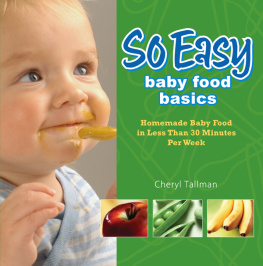

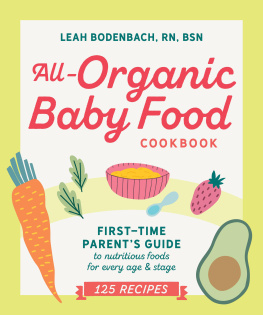
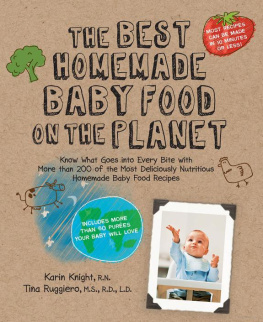
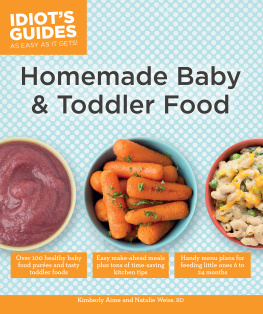
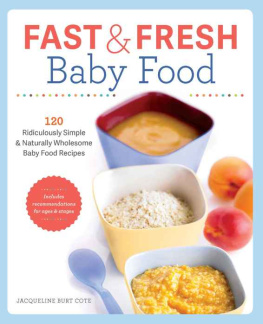
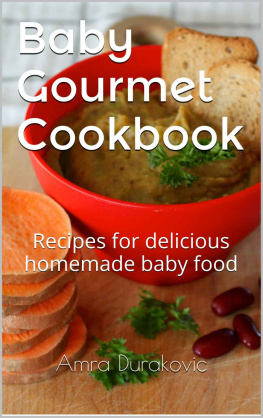
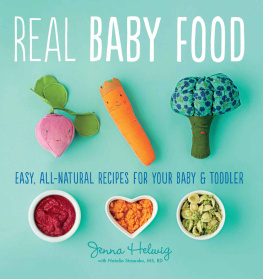
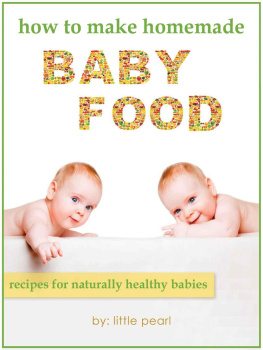





 Be a good role model. Babies learn through watching you and others around them. Be a positive force for your baby by eating healthy foods, such as fruits and vegetables. Remember, your baby will respond to what you like.
Be a good role model. Babies learn through watching you and others around them. Be a positive force for your baby by eating healthy foods, such as fruits and vegetables. Remember, your baby will respond to what you like. Dont give up. Babies tastes change daily. The fact that your baby spits out peas one day does not mean he doesnt like them. Unless he has shown signs of an allergic reaction, try the food again in a couple days-you may be pleasantly surprised.
Dont give up. Babies tastes change daily. The fact that your baby spits out peas one day does not mean he doesnt like them. Unless he has shown signs of an allergic reaction, try the food again in a couple days-you may be pleasantly surprised. Offer variety. All foods contain different vitamins and nutrients. Eating many types of foods will lead to a balanced diet. When your baby first starts eating, the amount is not as important as the variety.
Offer variety. All foods contain different vitamins and nutrients. Eating many types of foods will lead to a balanced diet. When your baby first starts eating, the amount is not as important as the variety. Encourage drinking water. Water helps the body digest foods. As your baby is introduced to solid food, the need for water is greater. At about 8 or 9 months old, offer your baby 2 to 3 ounces of water at each meal.
Encourage drinking water. Water helps the body digest foods. As your baby is introduced to solid food, the need for water is greater. At about 8 or 9 months old, offer your baby 2 to 3 ounces of water at each meal. Dont be in a rush. Many babies are slow eaters. At the beginning feeding time may go REALLY slowly. Allow plenty of time for meals so you and your baby can relax and enjoy your time.
Dont be in a rush. Many babies are slow eaters. At the beginning feeding time may go REALLY slowly. Allow plenty of time for meals so you and your baby can relax and enjoy your time. Never force babies to eat or to finish all their food. Your baby will eat when she is hungry. And she will eat the types of foods her body needs most. During meals allow her to eat as much or as little as she wants.
Never force babies to eat or to finish all their food. Your baby will eat when she is hungry. And she will eat the types of foods her body needs most. During meals allow her to eat as much or as little as she wants. Avoid distractions. Make mealtimes a family event. The whole family should eat together any time you can. This will help your baby learn to interact with others at mealtime and to begin developing social skills.
Avoid distractions. Make mealtimes a family event. The whole family should eat together any time you can. This will help your baby learn to interact with others at mealtime and to begin developing social skills. Be positive about vegetables and fruits. Let your baby know what he is eating when you are feeding him. Talk about the vitamins he is getting and about how important they are for growing bigger and stronger.
Be positive about vegetables and fruits. Let your baby know what he is eating when you are feeding him. Talk about the vitamins he is getting and about how important they are for growing bigger and stronger.